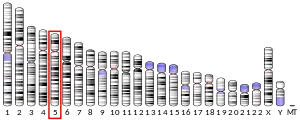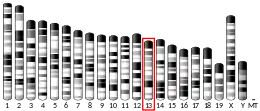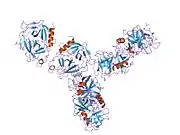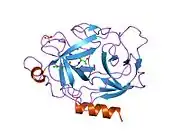Granzyme A
Granzyme A (GzmA, EC 3.4.21.78, CTLA3, HuTPS, T-cell associated protease 1, cytotoxic T lymphocyte serine protease, TSP-1, T-cell derived serine proteinase) is a tryptase[5][6][7] and is one of the five granzymes encoded in the human genome.[8][9][10] In humans, GzmA is encoded by the GZMA gene in proximity to the GZMK gene on chromosome 5. This enzyme is present in cytotoxic T lymphocyte (CTL) granules.
| Granzyme A | |||||||||
|---|---|---|---|---|---|---|---|---|---|
| Identifiers | |||||||||
| EC no. | 3.4.21.78 | ||||||||
| CAS no. | 143180-73-8 | ||||||||
| Databases | |||||||||
| IntEnz | IntEnz view | ||||||||
| BRENDA | BRENDA entry | ||||||||
| ExPASy | NiceZyme view | ||||||||
| KEGG | KEGG entry | ||||||||
| MetaCyc | metabolic pathway | ||||||||
| PRIAM | profile | ||||||||
| PDB structures | RCSB PDB PDBe PDBsum | ||||||||
| |||||||||
GzmA cleaves proteins after arginine or lysine basic residues. In CTL-targeted cells, it activates caspase-independent programmed cell death pathways that are unique and parallel to that of Granzyme B, although some substrates such as PARP-1[11] and lamin B[12] are shared with Granzyme B. Substrates of GzmA include Pro-IL-1β,[13] NDUFS3,[14] SET, APE1, and Ku70 among others. In vitro studies suggest that GzmA may have less cytotoxic capabilities than GzmB.[15][16]
In colorectal cancer, GzmA was associated with promotion of cancer development, which may be due to activation of inflammation-inducing cytokines from macrophages.[17]
References
- GRCh38: Ensembl release 89: ENSG00000145649 - Ensembl, May 2017
- GRCm38: Ensembl release 89: ENSMUSG00000023132 - Ensembl, May 2017
- "Human PubMed Reference:". National Center for Biotechnology Information, U.S. National Library of Medicine.
- "Mouse PubMed Reference:". National Center for Biotechnology Information, U.S. National Library of Medicine.
- Simon MM, Hoschützky H, Fruth U, Simon HG, Kramer MD (December 1986). "Purification and characterization of a T cell specific serine proteinase (TSP-1) from cloned cytolytic T lymphocytes". The EMBO Journal. 5 (12): 3267–74. doi:10.1002/j.1460-2075.1986.tb04638.x. PMC 1167321. PMID 3545816.
- Gershenfeld HK, Hershberger RJ, Shows TB, Weissman IL (February 1988). "Cloning and chromosomal assignment of a human cDNA encoding a T cell- and natural killer cell-specific trypsin-like serine protease". Proceedings of the National Academy of Sciences of the United States of America. 85 (4): 1184–8. Bibcode:1988PNAS...85.1184G. doi:10.1073/pnas.85.4.1184. PMC 279731. PMID 3257574.
- Odake S, Kam CM, Narasimhan L, Poe M, Blake JT, Krahenbuhl O, Tschopp J, Powers JC (February 1991). "Human and murine cytotoxic T lymphocyte serine proteases: subsite mapping with peptide thioester substrates and inhibition of enzyme activity and cytolysis by isocoumarins". Biochemistry. 30 (8): 2217–27. doi:10.1021/bi00222a027. PMID 1998680.
- Hameed A, Lowrey DM, Lichtenheld M, Podack ER (Nov 1988). "Characterization of three serine esterases isolated from human IL-2 activated killer cells". J Immunol. 141 (9): 3142–7. PMID 3262682.
- Masson D, Zamai M, Tschopp J (Dec 1986). "Identification of granzyme A isolated from cytotoxic T-lymphocyte-granules as one of the proteases encoded by CTL-specific genes". FEBS Lett. 208 (1): 84–8. doi:10.1016/0014-5793(86)81537-X. PMID 3533635. S2CID 10670230.
- "Entrez Gene: GZMA granzyme A (granzyme 1, cytotoxic T-lymphocyte-associated serine esterase 3)".
- Zhu, Pengcheng; Martinvalet, Denis; Chowdhury, Dipanjan; Zhang, Dong; Schlesinger, Ann; Lieberman, Judy (2009-08-06). "The cytotoxic T lymphocyte protease granzyme A cleaves and inactivates poly(adenosine 5'-diphosphate-ribose) polymerase-1". Blood. 114 (6): 1205–1216. doi:10.1182/blood-2008-12-195768. ISSN 1528-0020. PMC 2723016. PMID 19506301.
- Zhang, D.; Beresford, P. J.; Greenberg, A. H.; Lieberman, J. (2001-05-08). "Granzymes A and B directly cleave lamins and disrupt the nuclear lamina during granule-mediated cytolysis". Proceedings of the National Academy of Sciences of the United States of America. 98 (10): 5746–5751. Bibcode:2001PNAS...98.5746Z. doi:10.1073/pnas.101329598. ISSN 0027-8424. PMC 33284. PMID 11331782.
- Irmler, M.; Hertig, S.; MacDonald, H. R.; Sadoul, R.; Becherer, J. D.; Proudfoot, A.; Solari, R.; Tschopp, J. (1995-05-01). "Granzyme A is an interleukin 1 beta-converting enzyme". The Journal of Experimental Medicine. 181 (5): 1917–1922. doi:10.1084/jem.181.5.1917. ISSN 0022-1007. PMC 2191995. PMID 7722467.
- Martinvalet, Denis; Dykxhoorn, Derek M.; Ferrini, Roger; Lieberman, Judy (2008-05-16). "Granzyme A cleaves a mitochondrial complex I protein to initiate caspase-independent cell death". Cell. 133 (4): 681–692. doi:10.1016/j.cell.2008.03.032. ISSN 1097-4172. PMC 2840390. PMID 18485875.
- Martinvalet, Denis; Walch, Michael; Jensen, Danielle; Thiery, Jerome; Lieberman, Judy (Oct 29, 2009). "Response: Granzyme A: cell death–inducing protease, proinflammatory agent, or both?". Blood. 114 (8): 3969–3970. doi:10.1182/blood-2009-08-233577. PMC 2773496.
- Metkar, Sunil S.; Menaa, Cheikh; Pardo, Julian; Wang, Baikun; Wallich, Reinhard; Freudenberg, Marina; Kim, Stephen; Raja, Srikumar M.; Shi, Lianfa; Simon, Markus M.; Froelich, Christopher J. (2008-11-14). "Human and mouse granzyme A induce a proinflammatory cytokine response". Immunity. 29 (5): 720–733. doi:10.1016/j.immuni.2008.08.014. ISSN 1097-4180. PMID 18951048.
- Santiago, Llipsy; Castro, Marta; Sanz-Pamplona, Rebeca; Garzón, Marcela; Ramirez-Labrada, Ariel; Tapia, Elena; Moreno, Víctor; Layunta, Elena; Gil-Gómez, Gabriel; Garrido, Marta; Peña, Raúl; Lanuza, Pilar M.; Comas, Laura; Jaime-Sanchez, Paula; Uranga-Murillo, Iratxe (2020-07-07). "Extracellular Granzyme A Promotes Colorectal Cancer Development by Enhancing Gut Inflammation". Cell Reports. 32 (1): 107847. doi:10.1016/j.celrep.2020.107847. hdl:10230/45276. ISSN 2211-1247. PMID 32640217.
Further reading
- Pasternack MS, Bleier KJ, McInerney TN (1991). "Granzyme A binding to target cell proteins. Granzyme A binds to and cleaves nucleolin in vitro". J. Biol. Chem. 266 (22): 14703–8. doi:10.1016/S0021-9258(18)98743-0. PMID 1860869.
- Poe M, Bennett CD, Biddison WE, et al. (1988). "Human cytotoxic lymphocyte tryptase. Its purification from granules and the characterization of inhibitor and substrate specificity". J. Biol. Chem. 263 (26): 13215–22. doi:10.1016/S0021-9258(18)37694-4. PMID 3047119.
- Murphy ME, Moult J, Bleackley RC, et al. (1989). "Comparative molecular model building of two serine proteinases from cytotoxic T lymphocytes". Proteins. 4 (3): 190–204. doi:10.1002/prot.340040306. PMID 3237717. S2CID 35164948.
- Gershenfeld HK, Hershberger RJ, Shows TB, Weissman IL (1988). "Cloning and chromosomal assignment of a human cDNA encoding a T cell- and natural killer cell-specific trypsin-like serine protease". Proc. Natl. Acad. Sci. U.S.A. 85 (4): 1184–8. Bibcode:1988PNAS...85.1184G. doi:10.1073/pnas.85.4.1184. PMC 279731. PMID 3257574.
- Krähenbühl O, Rey C, Jenne D, et al. (1988). "Characterization of granzymes A and B isolated from granules of cloned human cytotoxic T lymphocytes". J. Immunol. 141 (10): 3471–7. PMID 3263427.
- Baetz K, Isaaz S, Griffiths GM (1995). "Loss of cytotoxic T lymphocyte function in Chediak-Higashi syndrome arises from a secretory defect that prevents lytic granule exocytosis". J. Immunol. 154 (11): 6122–31. PMID 7751653.
- Inoue M, Hoshino T, Fukuma T, et al. (1994). "Close co-localization of CD4 and a serine esterase tryptase TL2 on the cell-surface of human monocytoid and CD4+ lymphoid cells". Biochem. Biophys. Res. Commun. 201 (3): 1390–5. doi:10.1006/bbrc.1994.1857. PMID 7912927.
- Fink TM, Lichter P, Wekerle H, et al. (1994). "The human granzyme A (HFSP, CTLA3) gene maps to 5q11-q12 and defines a new locus of the serine protease superfamily". Genomics. 18 (2): 401–3. doi:10.1006/geno.1993.1483. PMID 8288245.
- Beresford PJ, Kam CM, Powers JC, Lieberman J (1997). "Recombinant human granzyme A binds to two putative HLA-associated proteins and cleaves one of them". Proc. Natl. Acad. Sci. U.S.A. 94 (17): 9285–90. Bibcode:1997PNAS...94.9285B. doi:10.1073/pnas.94.17.9285. PMC 23158. PMID 9256474.
- Spaeny-Dekking EH, Hanna WL, Wolbink AM, et al. (1998). "Extracellular granzymes A and B in humans: detection of native species during CTL responses in vitro and in vivo". J. Immunol. 160 (7): 3610–6. PMID 9531325.
- Zhang D, Beresford PJ, Greenberg AH, Lieberman J (2001). "Granzymes A and B directly cleave lamins and disrupt the nuclear lamina during granule-mediated cytolysis". Proc. Natl. Acad. Sci. U.S.A. 98 (10): 5746–51. Bibcode:2001PNAS...98.5746Z. doi:10.1073/pnas.101329598. PMC 33284. PMID 11331782.
- Beresford PJ, Zhang D, Oh DY, et al. (2001). "Granzyme A activates an endoplasmic reticulum-associated caspase-independent nuclease to induce single-stranded DNA nicks". J. Biol. Chem. 276 (46): 43285–93. doi:10.1074/jbc.M108137200. PMID 11555662.
- Fan Z, Beresford PJ, Zhang D, Lieberman J (2002). "HMG2 Interacts with the Nucleosome Assembly Protein SET and Is a Target of the Cytotoxic T-Lymphocyte Protease Granzyme A". Mol. Cell. Biol. 22 (8): 2810–20. doi:10.1128/MCB.22.8.2810-2820.2002. PMC 133744. PMID 11909973.
- Strausberg RL, Feingold EA, Grouse LH, et al. (2003). "Generation and initial analysis of more than 15,000 full-length human and mouse cDNA sequences". Proc. Natl. Acad. Sci. U.S.A. 99 (26): 16899–903. Bibcode:2002PNAS...9916899M. doi:10.1073/pnas.242603899. PMC 139241. PMID 12477932.
- Fan Z, Beresford PJ, Zhang D, et al. (2003). "Cleaving the oxidative repair protein Ape1 enhances cell death mediated by granzyme A". Nat. Immunol. 4 (2): 145–53. doi:10.1038/ni885. PMID 12524539. S2CID 29433133.
- Pinkoski MJ, Green DR (2003). "Granzyme A: the road less traveled". Nat. Immunol. 4 (2): 106–8. doi:10.1038/ni0203-106. PMID 12555094. S2CID 38687759.
- Saito S, Iida A, Sekine A, et al. (2003). "Catalog of 680 variations among eight cytochrome p450 ( CYP) genes, nine esterase genes, and two other genes in the Japanese population". J. Hum. Genet. 48 (5): 249–70. doi:10.1007/s10038-003-0021-7. PMID 12721789.
- Bell JK, Goetz DH, Mahrus S, et al. (2003). "The oligomeric structure of human granzyme A is a determinant of its extended substrate specificity". Nat. Struct. Biol. 10 (7): 527–34. doi:10.1038/nsb944. PMID 12819769. S2CID 9608837.
External links
- Granzyme+A at the U.S. National Library of Medicine Medical Subject Headings (MeSH)







